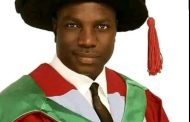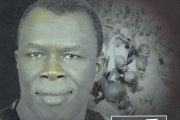By Grace Z. Kwaja

The author
In a well-publicized article that triggered series of reactions across the world, there was an argument on whether or not the co-habiting duo of Sesame Street, Bert and Ernie, were gays. According to the article, the duo “were created to teach pre-schoolers that people can be good friends with those who are very different from themselves.”
Sesame Street is a children’s television programme produced by the Children’s Television Network in 1968 and which was loved both by children and adults. It had the goal of using television to teach diversity through children. In Nigeria, it was aired in the 80’s and still remains a regular programme on some television stations. It has, however, undergone series of adaptations and is known in Nigeria today as Sesame Square.
Following the discussions on the kind of relationship that exist between Bert and Ernie, one is quick to reflect on how we perceived their role as children. To an average African child and to some of us who watched it during the 80’s while growing up, we imagined Ernie as an elder brother to a troublesome and yet smarter Berth. The idea of Bert and Ernie co-habiting posed no questions as to whether or not they were gays. Rather, our curiosity was as to whether or not they were brothers, why they lived alone and more importantly, where their parents were.
The smartness of Ernie was so intriguing even as he was always mischievous. As some of us admired him and found him funny, we also imagined Bert as a weak but kind hearted elder brother who was unfortunately always being trampled upon. The duo slept on separate beds which, to us, was normal for brothers. We saw them as children although no mention of “mum” and “dad” was ever made. That got us even more curious as to the whereabouts of their parents. These questions never got answers in my mind but what really struck me when I grew up was why there was so much vacuum, leaving children to wonder and ask questions. Could it have been a strategy to help kids develop inquisitive minds?

Alhaji Modibbo Kawu, NBC boss
With these arguments coming up now, one begins to ponder on the actor’s claim of Ernie being gay and why the company is in denial of it. Not many organizations frown on gay scenes these days. In fact, homosexual scenes are fast becoming normal reoccurrences in some children’s television programmes. Is it that the sesame Street organisation is shying away from something that might be true? Could it also be that the two actors had that in mind in the first place and now want to gain attention or that they feel now is the right time to truly express what had to be hidden back then? Could it have been an underlying element and thus the vacuum?
In this part of the world, by which I mean much of Africa, children wouldn’t easily entertain such ideas as being gay. Such thoughts did not, therefore, cross one’s mind at that time. It is amazing how society has evolved and how very different things are these days. One then wonders if the orientation of kids in Africa today has also changed or if it is still the same as it used to be when we were growing up.
Now that the issue of homosexuality is becoming rampant in children’s programmes even when most African societies frown at it, the question of what the Nigerian Broadcasting Corporation, (NBC) and other regulatory bodies have been doing and/or plan to do has become an issue. Intensifying bringing such under their searchlights must be a crucial dimension of re-directing society in Nigeria.
The author is a Ph.D candidate in Information and Communication Science @ the Universite du Bourgogne Franche-Comte in France




























